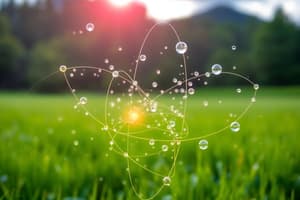Podcast
Questions and Answers
What is the primary goal of science?
What is the primary goal of science?
- To discover all natural resources
- To prove all hypotheses true
- To understand the natural world (correct)
- To validate existing scientific laws
Which statement best describes a scientific law?
Which statement best describes a scientific law?
- A theory that remains unchanged through time
- An assumption that must be tested for validity
- A statement that describes consistent occurrences under specific conditions (correct)
- A definitive explanation for all natural phenomena
What happens to scientific ideas when new observations are made?
What happens to scientific ideas when new observations are made?
- They may be revised or replaced as necessary (correct)
- They must adhere to conventional wisdom
- They cannot be modified due to their validity
- They are always replaced with entirely new theories
How did Albert Einstein contribute to scientific understanding?
How did Albert Einstein contribute to scientific understanding?
Which of the following is NOT a characteristic of scientific inquiry?
Which of the following is NOT a characteristic of scientific inquiry?
What is often the starting point for generating new scientific ideas?
What is often the starting point for generating new scientific ideas?
Which example illustrates a scientific law?
Which example illustrates a scientific law?
What role do natural laws play in scientific inquiry?
What role do natural laws play in scientific inquiry?
What is the primary basis on which science operates?
What is the primary basis on which science operates?
Which of the following is considered an example of a quantitative observation?
Which of the following is considered an example of a quantitative observation?
What distinguishes qualitative observations from quantitative observations?
What distinguishes qualitative observations from quantitative observations?
What is the nature of scientific theories that withstand the test of time?
What is the nature of scientific theories that withstand the test of time?
Why is the question 'Was life on Earth created through another method?' outside the realm of science?
Why is the question 'Was life on Earth created through another method?' outside the realm of science?
What is the first step in a typical scientific investigation?
What is the first step in a typical scientific investigation?
Which statement is true regarding the scientific method?
Which statement is true regarding the scientific method?
What did John Dalton propose that is still considered valid today?
What did John Dalton propose that is still considered valid today?
Flashcards are hidden until you start studying
Study Notes
Goal of Science
- Science aims to understand the natural world through systematic study.
- Scientists make assumptions including that nature is governed by natural laws and that scientific ideas can be revised.
Understanding Nature
- Nature is seen as a unified system influenced by natural laws.
- Scientific laws describe consistent behaviors under specific conditions, such as the law of gravity, articulated by Sir Isaac Newton.
- Newton’s laws of motion and gravity explained numerous natural phenomena, including the motion of falling objects and lunar orbits.
Evolution of Scientific Ideas
- Science is dynamic; it evolves and adapts through ongoing testing and revision of ideas.
- New observations can challenge existing theories, transforming them rather than invalidating them.
- Albert Einstein’s theory of relativity expanded upon Newtonian physics without discarding it, illustrating the layering of scientific understanding.
Endurance of Scientific Knowledge
- Long-lasting scientific theories, such as John Dalton’s atomic theory, remain validated after centuries of scrutiny.
- Many foundational scientific concepts are routinely tested and reaffirmed within various branches of science, including biology.
Limitation of Science
- Science relies on observable evidence and logic, excluding questions regarding the unobservable, such as supernatural phenomena.
- Example questions:
- Observable: Did life on Earth evolve over time?
- Non-observable: Was life created through a different method?
Scientific Method
- The scientific method guides scientific investigations, providing a structured approach to inquiry.
- Investigations typically begin with making observations, followed by a plan to test hypotheses.
Types of Observations
- Quantitative Observations: Involve numerical data and measurements, yielding specific results (e.g., “the girl has 85 cents”).
- Qualitative Observations: Offer descriptive, non-numeric insights, often leading to vagueness (e.g., “the girl has very little money”).
Studying That Suits You
Use AI to generate personalized quizzes and flashcards to suit your learning preferences.




